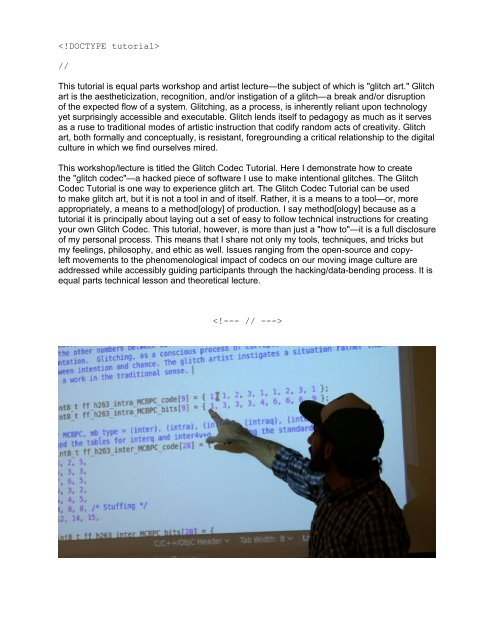Glitch Codec Tutorial - Nick Briz
Glitch Codec Tutorial - Nick Briz
Glitch Codec Tutorial - Nick Briz
Create successful ePaper yourself
Turn your PDF publications into a flip-book with our unique Google optimized e-Paper software.
//<br />
This tutorial is equal parts workshop and artist lecture—the subject of which is "glitch art." <strong>Glitch</strong><br />
art is the aestheticization, recognition, and/or instigation of a glitch—a break and/or disruption<br />
of the expected flow of a system. <strong>Glitch</strong>ing, as a process, is inherently reliant upon technology<br />
yet surprisingly accessible and executable. <strong>Glitch</strong> lends itself to pedagogy as much as it serves<br />
as a ruse to traditional modes of artistic instruction that codify random acts of creativity. <strong>Glitch</strong><br />
art, both formally and conceptually, is resistant, foregrounding a critical relationship to the digital<br />
culture in which we find ourselves mired.<br />
This workshop/lecture is titled the <strong>Glitch</strong> <strong>Codec</strong> <strong>Tutorial</strong>. Here I demonstrate how to create<br />
the "glitch codec"—a hacked piece of software I use to make intentional glitches. The <strong>Glitch</strong><br />
<strong>Codec</strong> <strong>Tutorial</strong> is one way to experience glitch art. The <strong>Glitch</strong> <strong>Codec</strong> <strong>Tutorial</strong> can be used<br />
to make glitch art, but it is not a tool in and of itself. Rather, it is a means to a tool—or, more<br />
appropriately, a means to a method[ology] of production. I say method[ology] because as a<br />
tutorial it is principally about laying out a set of easy to follow technical instructions for creating<br />
your own <strong>Glitch</strong> <strong>Codec</strong>. This tutorial, however, is more than just a "how to"—it is a full disclosure<br />
of my personal process. This means that I share not only my tools, techniques, and tricks but<br />
my feelings, philosophy, and ethic as well. Issues ranging from the open-source and copyleft<br />
movements to the phenomenological impact of codecs on our moving image culture are<br />
addressed while accessibly guiding participants through the hacking/data-bending process. It is<br />
equal parts technical lesson and theoretical lecture.<br />


